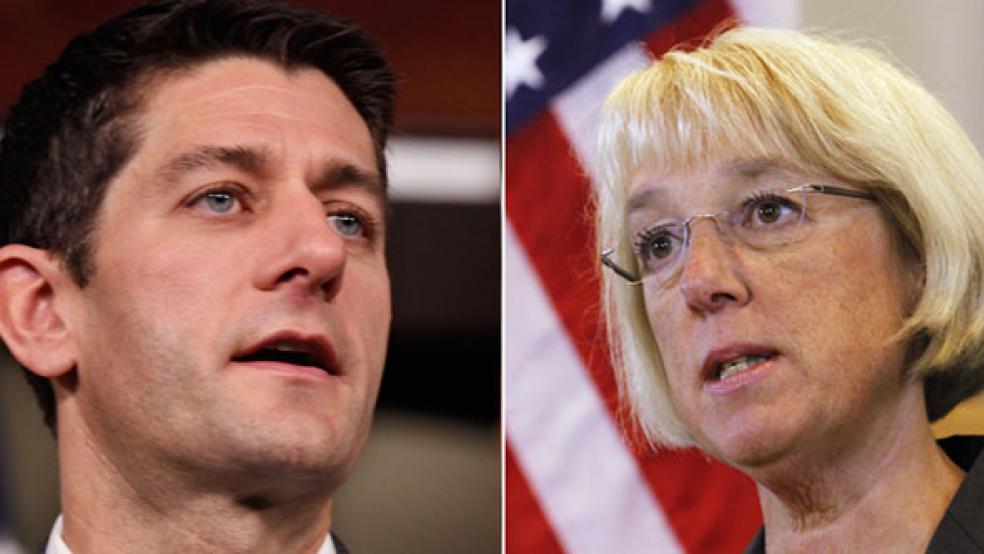It didn’t take long Wednesday for rosy talk about bipartisanship and “common ground” to give way to bare-knuckled haggling over a new budget as the first House-Senate budget conference committee in four years formally convened.
Like two veteran prize fighters, House Budget Committee Chairman Paul Ryan (R-WI) and Senate Budget chief Patty Murray (D-WA) touched gloves and staked out their positions – which underscored the vast gulf separating the two parties over spending, entitlement reform and taxes.
RELATED: MEET THE PLAYERS FOR THE 2014 FISCAL FINALS
As part of the deal that temporarily ended the government shutdown and raised the $16.7 trillion debt ceiling through Feb. 7, congressional Republicans and Democrats agreed to negotiate a spending blueprint for the remainder of the new fiscal year. The 29-member panel faces tremendous challenges, however – including a Dec. 13 deadline.
Murray’s budget allocates $1.058 trillion for FY ‘14 discretionary programs, while Ryan’s budget allocates just $967 billion. Both budgets also violate aspects of the Budget Control Act’s spending strictures: Murray’s budget effectively ignores the sequestration requirement triggered by the failure of the so-called 2011 Super Committee and includes $91 billion more in spending than is allowed. The Ryan budget, meanwhile, adheres to the overall level – but allocates $54 billion more for defense programs than called for and does so by shifting funds away from domestic programs.
But the show stopper is over taxes. Murray’s plan calls for $975 billion in additional revenues over a decade – while Ryan’s budget has no new revenues but does assume that expiration of several tax credits, including the alternative minimum tax credit and several credits within the Affordable Care Act, which would save about $160 billion over 10 years.
In her opening remarks on Capitol Hill this morning, Murray said Republicans must agree to close “wasteful tax loopholes and cut “special interest subsidies” as a part of any deal.
Ryan quickly rejected the proposal, saying that “if this conference becomes an argument over taxes, we’re not going to get anywhere.”
RELATED: OBAMA’S BIG BUDGET BATTLE: THERE WILL BE BLOOD
Taxes are a perennial sore point for the two sides, and Republicans refuse to approve additional tax increases on top of what they reluctantly agreed to last January as part of measures to avert the fiscal cliff.
Without a compromise on taxes, the prospects for some kind of “grand bargain” of spending, entitlement and tax reforms are practically nil. Republicans are also in no hurry to cancel the second year of automatic across-the-board spending cuts under the sequester – unless they get concessions from Democrats on defense spending.
“The sequester was designed to be stupid and painful and it has filled that bill,” said Sen. Sheldon Whitehouse (D-RI).
While they agree with Democrats that automatic spending cuts are a bad way to control spending, Republicans want to keep in place the overall sequester number. If Congress doesn’t act, that number would fall to $967 billion in January — a nearly $20 billion reduction in defense spending. However, they want to replace the cuts to defense.
RELATED: BATTLE OF THE BUDGET KNIGHTS AS DEADLINE NEARS
“With $17 trillion in debt, the savings that we are realizing from the Budget Control Act should not be ignored,” said Sen. Kelly Ayotte (R-NH).
The conference committee – established earlier this year as part of the deal to reopen the government and raise the debt limit – has less than two months to come up with a deal. The group won’t meet again until Nov 13.
Lawmakers aren’t hopeful the conference committee will arrive at an agreement. The top Democrat on the House Budget Committee, Rep. Chris Van Hollen of Maryland, told CNN that he puts the odds at any deal coming out of the panel at “50-50.”
Paul Ryan, for his part, said in his opening remarks: “The bar is pretty low, let’s see if we can clear it. We won’t resolve all our differences here. We won’t solve all our problems. But we can make a good start. And we should because we owe it to the country.”






